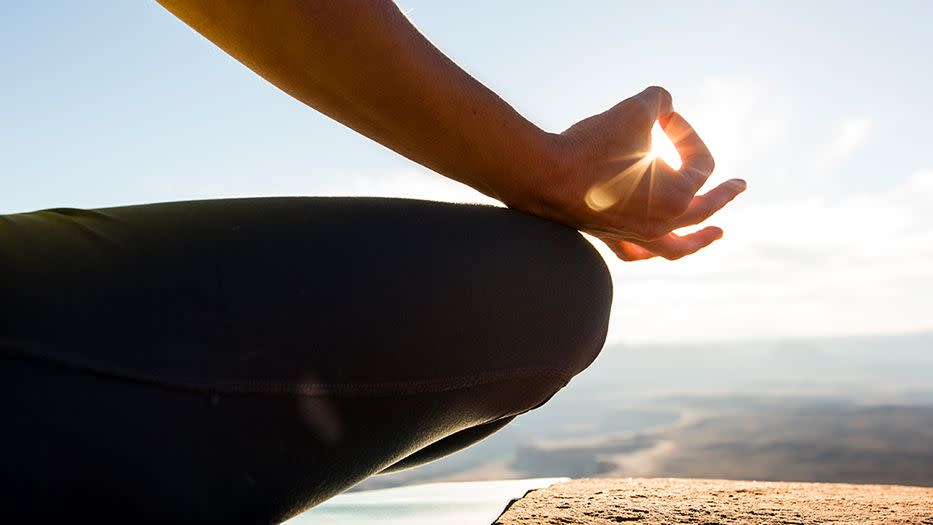Spending an Entire Weekend Focusing On Workout Recovery Opened My Eyes to Just How Much I Need It

Photo: Jordan Siemens / Getty Images
When one gets invited to attend a weekend of workouts at a gorgeous resort in the Arizona desert with a bunch of other fitness fanatics and top trainers, one gives a resounding, "Hell, yes." That's precisely what I said when I was invited to the Michelob Ultra FitFest last month-except, before I could even throw my running shoes in a bag, I knew I had one big problem. I was totally burned out.
As a health writer with a busy workout schedule and a looming half marathon approaching, I had been pushing myself harder than usual, squeezing in miles and strength training classes until I crashed, too tired to even go to a restorative yoga class on the weekend even though my body was begging for it. The trio of foam rollers in the corner of my room was gathering dust.
The idea of spending a weekend doing four-a-day boot-camp classes was giving me some anxiety. I knew what my body really needed was some time for recovery. So, I switched up my schedule to focus on balance. Here's what I learned about just how badly I needed it.
Why Workout Recovery Is So Important
Recovery days-think: yin yoga, foam rolling, slowing your pace to go for a walk instead of a run-are just as important as workout days, says Alissa Rumsey, C.S.C.S., R.D., a personal trainer and nutritionist in New York. In case you need a refresher, "rest days give your muscles and connective tissue time to rebuild between workouts," explains Rumsey. "If you aren't taking enough time for recovery, then you'll continue to break down your muscles and won't see benefits from your workouts." (P.S. This Is What Your Ultimate Recovery Day Should Look Like)
Rest and recovery days are also key to helping you prevent injuries-something I was starting to worry about as my hips had recently taken to aching on long runs. "If you aren't allowing time for your body to recover between workouts, you are more likely to develop an injury. Plus, too much exercise and not enough rest can also cause sleep disturbances, an impaired immune system, and mental fatigue," says Rumsey.
Yeah, I definitely needed a couple of recovery days. So, instead of the HIIT and dance cardio classes I had planned to pack in that weekend, I booked only two classes-yoga for both mornings-and filled the rest of my schedule with foam rolling clinics, balance and stability training, and plenty of downtime to lounge by the pool and hike the surrounding desert trails.
Work Hard, Recover Harder
Almost immediately, I realized my weekend of recovery was going to be way harder than I thought. Surrounded by fitness influencers and fellow health nuts, all anyone wanted to do was compare schedules: Are you taking Shawn Booth's Boothcamp? How about the City Surf class? How many cycling classes are you signed up for? While everyone else was busy sweating it out, I was going to be feeling lazy by the pool.
But no sooner had my weekend of recovery started than I knew I'd definitely made the right decision. Instead of getting up and going for a run first thing in the morning (my usual routine that's lately been leaving me feeling achy and drained by lunch), I went for a slow and steady sunrise hike instead, feeling awake and revitalized by the time I arrived at a.m. yoga.
After a particularly juicy yoga class in which I realized just how sore and stiff every single muscle in my body had been, I went in for balance and stability training. There, Polly de Mille, an exercise physiologist and the clinical supervisor of the Tisch Sports Performance Center at the Hospital for Special Surgery in New York, had me kick off my tennis shoes and do simple balance exercises to assess where I might be opening myself up to running injuries, giving me simple moves to build up my stability. Next up, an hour-long foam rolling clinic where de Mille had us plop down on mats and roll through every muscle group section by excruciatingly good section. Walking out, I felt like I'd literally been given a new body-the kind of wrung-out bliss you feel after a day spent at the spa.
Afterward, I took a nap-yes, a nap-before heading to the pool for some gentle laps. By dinner, as everyone recounted tales of their super-intense days and compared sore muscles, I barely felt like I'd missed out at all.
What I Learned About Prioritizing Recovery
When I'd first planned my recovery weekend schedule, I felt like I'd be doing nothing all weekend. But by the time I was on the plane home, I realized I'd done so much for my body.
After just two measly days focusing on recovery, I felt like my body was screaming "Thank you!" My muscles were a little sore from the yoga and hiking but not in pain, my flexibility and mobility had noticeably improved, and when I woke up (feeling well-rested before my 7 a.m. alarm even went off, I might add), I felt fresher than I had in months, without a hint of stiffness and barely a creaky joint.
The feeling made me realize just how off-balance I'd let my routine get. Since I won't be heading off on a yoga retreat every weekend (if only…), I needed to bring that balance back into my weekly routine by prioritizing active recovery and rest days. Sometimes that's easier said than done, but I've started by dusting off my foam roller. At the suggestion of de Mille, I've started carving out 15 minutes before my morning run to roll-a habit that's helping me feel less sore post-run. Taking that extra time means cutting my morning miles a little short but that's okay-my body deserves it.

